4 Best Practices for Effective Skin Hydration You Need Today

Overview
The article presents four best practices for effective skin hydration, underscoring the critical role of moisture retention in preserving skin health and appearance. It details essential strategies:
- Drinking ample fluids
- Utilizing a humidifier
- Applying moisturizer on damp skin
- Incorporating hydrating ingredients such as hyaluronic acid and glycerin
Each of these practices contributes significantly to enhanced skin moisture levels and overall dermal vitality. By adopting these methods, individuals can elevate their skin care routine, ensuring a radiant and healthy complexion.
Introduction
Understanding the intricacies of skin hydration is essential for anyone seeking a radiant and youthful complexion. Moisture retention plays a pivotal role in maintaining skin elasticity and overall health; thus, the importance of effective hydration practices cannot be overstated. Amidst the plethora of advice and products available, individuals often struggle to discern the most effective strategies to combat dryness and enhance their skin's moisture levels. This article delves into the best practices for skin hydration, offering valuable insights and actionable tips that promise to transform any skincare routine.
Equip yourself with the knowledge to elevate your skincare regimen and achieve the healthy, hydrated skin you desire.
Define Skin Hydration and Its Importance
Moisture retention, which is vital for skin hydration, refers to the water content within the dermis that is essential for maintaining elasticity, softness, and overall skin health. Sufficient moisture allows the outer layer to act as a protective barrier against environmental stressors, preventing dryness and irritation. A dehydrated dermis can result in several issues, including increased sensitivity, premature aging, and a weakened barrier. Understanding the importance of water intake is the foundational step in developing an effective skincare regimen that promotes a healthy, radiant complexion.
Research indicates that skin hydration is essential, as well-hydrated skin appears fuller and more resilient, underscoring moisture as a pivotal factor in achieving a youthful appearance. Additionally, moisture supports the body's natural healing processes, enhancing its ability to recover from damage and maintain a balanced appearance. Dermatologists emphasize that skin hydration is vital for retaining moisture and delivering essential nutrients to skin cells.
Incorporating advanced treatments such as SQT Bio-Microneedling at Tsavo Wellness can significantly elevate moisture levels. This innovative therapy utilizes Spongilla spicules to create millions of microchannels in the dermis, stimulating collagen and elastin production while improving the absorption of topical products by up to 3,000%. This not only boosts skin hydration but also rejuvenates the skin's surface, making it an effective solution for various concerns, such as dryness and aging.
Moreover, integrating foods rich in Omega-3s, antioxidants, and water-dense fruits and vegetables can further enhance the body's moisture levels. For instance, studies reveal that adequate moisture can improve the texture and elasticity of the dermis, with benefits persisting even after the cessation of moisture treatments. However, it is crucial to note that while moisture is essential, it may not resolve all dermal issues, and professional consultation may be necessary for persistent concerns. Environmental factors, such as indoor heating during winter, can also deplete moisture from the air, adversely impacting the dermis's moisture levels.

Implement Effective Hydration Techniques
To achieve optimal skin hydration, it is essential to implement best practices that yield significant results:
-
Drink Plenty of Liquids: Aim for a minimum of 8 glasses of fluid daily. Adequate skin hydration is crucial, as it not only promotes overall well-being but also enhances the appearance of your complexion. A study conducted by CBIOS and Universidad de Alcalá de Henares found that increased dietary water intake significantly improved moisture levels and dermal elasticity, underscoring the importance of water in maintaining skin hydration.
-
Use a Humidifier: In dry environments, particularly during winter, a humidifier can substantially boost moisture levels. By adding humidity to the air, it helps prevent dryness and irritation, making it an indispensable tool for maintaining skin hydration and a healthy skin barrier.
-
Limit Hot Showers: High temperatures can strip the skin of its natural oils, leading to dryness. Opt for warm water and limit shower time to 5-10 minutes to preserve your skin hydration.
-
Apply Moisturizer on Damp Skin: For optimal results, apply your moisturizer while your skin is still damp post-cleansing. Dermatologist Dr. Shreya Andric emphasizes that hydrating serums and emollients work best on damp surfaces to improve skin hydration, enhancing moisture retention and ingredient absorption.
-
Incorporate Hydrating Products: Utilize serums and creams infused with hyaluronic acid, glycerin, or aloe vera. These ingredients are renowned for their ability to draw moisture into the skin, ensuring skin hydration and promoting a plump and radiant complexion.
-
Regular Exfoliation: Exfoliate 1-2 times a week to remove dead skin cells. This practice allows moisturizing products to penetrate more effectively, ensuring your skin hydration routine delivers the full benefits. However, be mindful of over-hydration, as excessive moisture can lead to issues such as milia or a greasy texture.
By adopting these strategies, you can significantly enhance your skin hydration and improve your skin's moisture levels and overall health, resulting in a radiant and youthful appearance.

Assess the Impact of Diet and Lifestyle on Hydration
Diet and lifestyle significantly impact skin hydration of the epidermis. To optimize your skin's moisture levels, consider these essential factors:
-
Hydrating Foods: Incorporate fruits and vegetables with high water content, such as cucumbers, watermelon, and oranges. These foods not only hydrate but also provide essential vitamins and antioxidants that enhance dermal wellness. Research suggests that a balanced diet abundant in these hydrating items can improve skin hydration levels, akin to the impact of topical moisturizers. The European Food Safety Authority advises a daily fluid consumption of 2.0 L for women and 2.5 L for men, underscoring the significance of maintaining proper fluid levels.
-
Limit Dehydrating Substances: Caffeine and alcohol can lead to dehydration, adversely affecting dermal health. It is advisable to decrease their consumption; alternatively, choose herbal teas or infused beverages to sustain moisture. Studies indicate that increased dietary water consumption can greatly enhance skin hydration levels in the body, especially for those with minimal daily water intake. It is recommended to restrict alcohol consumption to 14 units weekly to enhance overall fluid balance.
-
A balanced diet abundant in nutritious fats, particularly omega-3 fatty acids found in fish, nuts, and seeds, is essential for maintaining skin hydration and preserving the barrier function and moisture levels. Nutritionists stress that a varied diet, incorporating these essential fats, promotes overall health and aids in preventing dryness. The UK guidelines recommend consuming at least one portion of oily fish per week to meet omega-3 needs.
-
Regular exercise: Engaging in physical activity improves blood circulation, which can lead to better skin hydration levels in the dermis. However, it’s crucial to hydrate adequately before and after workouts to replenish lost fluids. Research has indicated that enhanced blood flow can result in more effective nutrient transport to the epidermis, further aiding moisture retention.
-
Adequate sleep is essential for skin hydration and tissue repair. Aim for 7-9 hours of sleep each night to enable your complexion to recover and rejuvenate. Inadequate sleep can lead to heightened transepidermal water loss, worsening dryness and compromising the skin's barrier function.
By concentrating on these factors, individuals can greatly enhance their moisture levels and overall dermal health.

Select Key Ingredients for Optimal Hydration
When selecting products that promote optimal skin hydration, it is crucial to consider these essential ingredients that can transform your skincare routine.
-
Hyaluronic Acid stands out as a potent humectant, capable of retaining up to 1,000 times its weight in liquid. This makes it indispensable for drawing moisture to the skin's surface. A 2021 study demonstrated that applying topical hyaluronic acid twice daily significantly enhanced moisture levels, improving elasticity and reducing the visibility of fine lines. Experts underscore its role in promoting dermal health; Jamie Eske notes that hyaluronic acid binds to water molecules, which is essential for skin hydration to keep the complexion hydrated and supple.
-
Glycerin is another effective humectant, adept at drawing moisture from the environment into the dermis for lasting hydration. Research shows that glycerin not only hydrates but also bolsters barrier function, making it a critical component in many formulations. This dual action fosters overall dermal health and resilience, enhancing skin hydration.
-
Ceramides are vital lipids that restore the skin’s barrier, preventing moisture loss and enhancing hydration retention. Their ability to fortify the body's natural defenses is well-documented, establishing them as essential ingredients in products that emphasize skin hydration.
-
Aloe Vera, celebrated for its soothing properties, not only hydrates but also calms irritated areas. Its natural composition promotes skin health, making it a favored choice in moisturizers and soothing gels.
-
Squalane is a lightweight oil that mimics the body's natural oils, delivering moisture without clogging pores. Its non-comedogenic nature makes it suitable for all skin types, enhancing hydration while allowing the skin to breathe.
-
Natural Moisturizing Factors (NMF), comprising amino acids, urea, and lactic acid, play a crucial role in maintaining moisture levels and barrier function. Products containing these components are particularly effective in keeping the skin surface moisturized and in optimal condition.
Incorporating these essential components into your skincare regimen can significantly enhance skin hydration, resulting in healthier, more radiant complexions. However, it is important to be cautious of common pitfalls, such as the potential for hyaluronic acid to induce dryness if not used correctly. By understanding these ingredients and their applications, you can make informed choices that elevate your skincare routine.

Conclusion
Maintaining effective skin hydration is essential for achieving a healthy, youthful complexion. Adequate moisture retention not only enhances skin elasticity and softness but also acts as a protective barrier against environmental stressors. By understanding and implementing best practices for skin hydration, individuals can significantly improve overall skin health and appearance.
Key strategies for optimal hydration include:
- Drinking plenty of fluids
- Utilizing humidifiers
- Applying moisturizers on damp skin
Additionally, incorporating hydrating foods and limiting dehydrating substances, such as caffeine and alcohol, play a crucial role in optimizing skin moisture levels. Selecting the right ingredients—like hyaluronic acid and glycerin—further emphasizes the need for a comprehensive skincare approach that prioritizes hydration.
Ultimately, prioritizing skin hydration transcends mere aesthetics; it is a fundamental aspect of overall health and well-being. By adopting these best practices and being mindful of dietary and lifestyle choices, individuals can cultivate a radiant complexion while supporting their skin’s natural functions. Embracing these hydration techniques is vital for lasting benefits, making it essential to incorporate them into daily routines for optimal skin health.
Frequently Asked Questions
What is skin hydration and why is it important?
Skin hydration refers to the water content within the dermis, which is essential for maintaining elasticity, softness, and overall skin health. It acts as a protective barrier against environmental stressors and prevents dryness and irritation.
What are the consequences of a dehydrated dermis?
A dehydrated dermis can lead to increased sensitivity, premature aging, and a weakened barrier, which can negatively impact overall skin health.
How does skin hydration affect the appearance of the skin?
Well-hydrated skin appears fuller and more resilient, contributing to a youthful appearance and supporting the body's natural healing processes.
What role do dermatologists play in skin hydration?
Dermatologists emphasize the importance of skin hydration for retaining moisture and delivering essential nutrients to skin cells.
What is SQT Bio-Microneedling and how does it improve skin hydration?
SQT Bio-Microneedling is an advanced treatment that utilizes Spongilla spicules to create microchannels in the dermis, stimulating collagen and elastin production and improving the absorption of topical products, which enhances skin hydration.
How can diet impact skin hydration?
Incorporating foods rich in Omega-3s, antioxidants, and water-dense fruits and vegetables can enhance the body's moisture levels, improving the texture and elasticity of the dermis.
Are the benefits of moisture treatments long-lasting?
Yes, studies indicate that adequate moisture can improve the texture and elasticity of the dermis, with benefits persisting even after moisture treatments are stopped.
What environmental factors can affect skin hydration?
Environmental factors like indoor heating during winter can deplete moisture from the air, adversely impacting the moisture levels in the dermis.
Should individuals seek professional consultation for skin hydration issues?
Yes, while moisture is essential, it may not resolve all dermal issues, and professional consultation may be necessary for persistent concerns.
